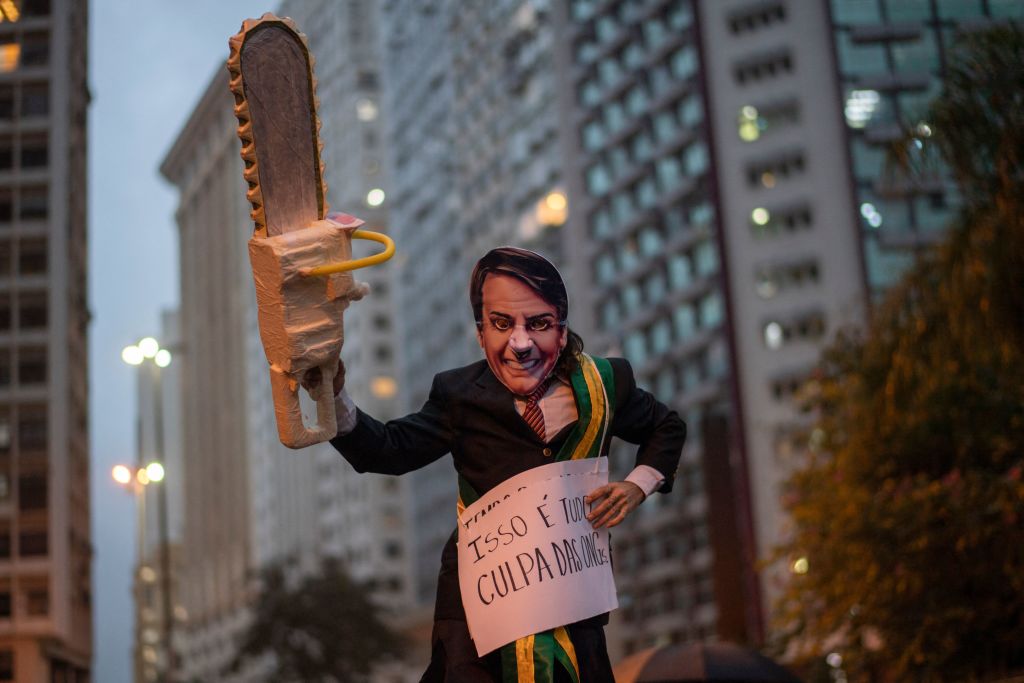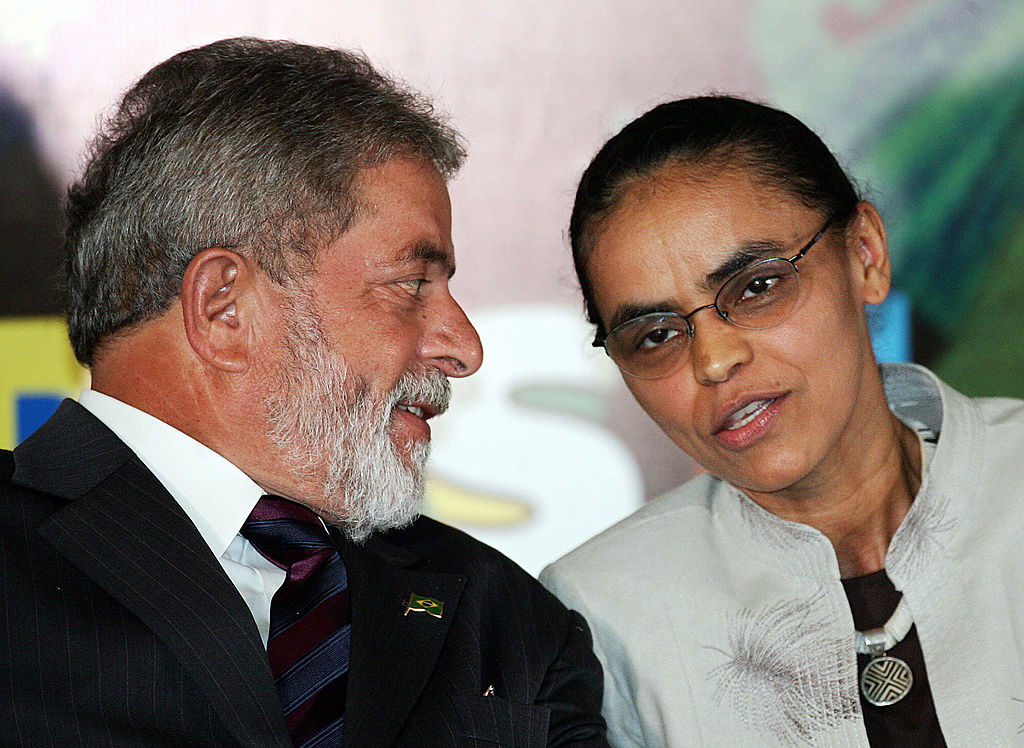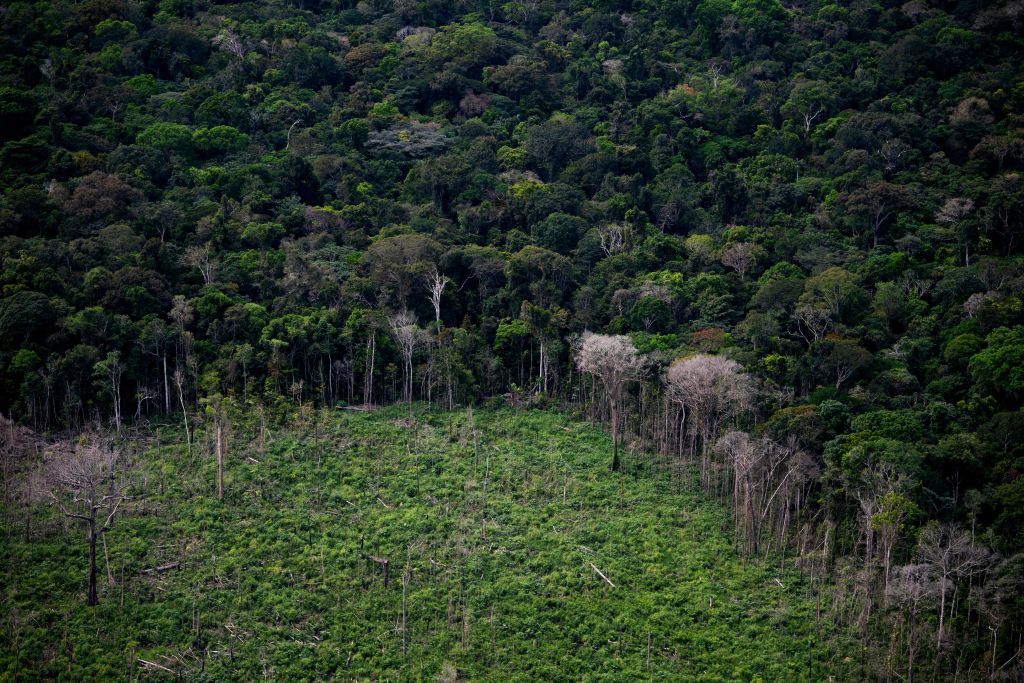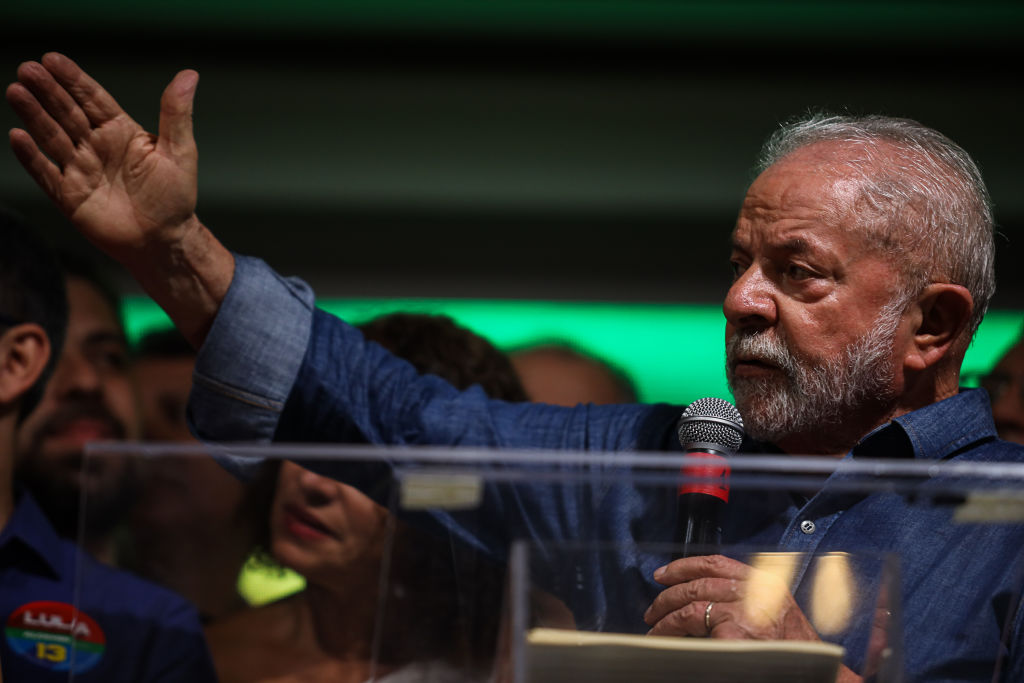It’s the best news the global climate movement has had in a while: on Sunday night Brazil’s far-right President Jair Bolsonaro, who has overseen an unrelenting surge in deforestation in the Amazon rainforest, narrowly lost out on a second term. Luiz Inácio Lula da Silva, the leftist former President who will replace him, has pledged to protect the crucial carbon sink—and has a track record to back up his promises.
Since taking office in 2019, Bolsonaro has gutted the budgets of agencies tasked with enforcing Brazil’s environmental laws, and sought to scrap protections for nature and Indigenous lands. The moves aimed to strengthen Bolsonaro’s support among small-holder farmers, loggers, and miners, who see the Amazon’s fertile lands, 60% of which lie in Brazil, as an economic opportunity to be exploited. Over the first three years of Bolsonaro’s presidency alone, over 12,800 square miles of the Brazilian Amazon were cleared—60% more than in the three years before.
Scientists say large parts of the lush rainforest have begun to degrade into savannah, and that the Amazon biome now emits more carbon dioxide than it absorbs. Another four years of the policies Bolsonaro pledged to continue would likely have accelerated those trends—with disastrous consequences for global atmospheric carbon levels. “If Bolsonaro is re-elected, the rainforest is doomed, and with it, all of humanity,” Sônia Guajajara, an Indigenous leader and Congresswoman, wrote in TIME ahead of the vote.

Compare that to what Lula’s government and that of his Workers’ Party successor Dilma Roussef achieved when in office between 2004 and 2012: cutting the annual rate of deforestation in the Amazon by 80%. “Now, we are going to fight for zero deforestation,” the president-elect said during his victory speech on Sunday. “Brazil and the planet need a living Amazon.”
Lula faces a massive challenge to deliver. The organized crime groups responsible for much of the deforestation in the Amazon have grown far stronger since his first presidency, and it will require huge investment to restore law enforcement’s presence across the vast and remote rainforest. And though Bolsonaro lost the presidency, a large number of his allies won seats in congress at national elections earlier this month, and they could try to keep the current president’s development agenda for the Amazon alive.
But there’s huge space for optimism, according to Marcio Astrini, executive director of Brazil’s Climate Observatory, a network of national NGOs. “Lula has never faced an atmosphere in favor of protecting the forest,” he says, citing intense pressure from foreign governments, global commodities markets, and Brazil’s Indigneous and civil society movements, which have mobilized like never before in response to the Bolsonaro government. And then there’s Lula himself: “I’ve never heard a president of Brazil speak like he did about the Amazon in a victory speech. Lula is clearly very personally committed that this is going to be a key part of his government.”
What happened to the Amazon under Lula’s first presidency?
Brazil’s problem in the Amazon isn’t about a lack of legislation. Roughly 90% of deforestation that takes place in the country is illegal under the nation’s forest code and other environmental laws. But enforcement struggles have allowed a massive 34% of the Brazilian Amazon to be cleared since 1985—much more than any other country’s share. Cattle ranching has become the main driver of deforestation in Brazil as global demand for beef has increased over the last few decades. But soy farmers, small-scale miners, and loggers also play a role. Agriculture and deforestation now make up 61.5% of Brazil’s annual greenhouse gas emissions.

When Lula took office in 2003, he inherited very high rates of deforestation, and the amount of forest loss peaked in 2004, at around 10,800 square miles. After that, Lula’s environment minister Marina Silva—who some expect to return to the role in Lula’s new government—instituted a three point plan to cut deforestation. It focused on: a) improving the management of public lands and land records, b) cracking down on law breakers with fines and expanding state presence in the rainforest, and c) incentivizing sustainable agriculture and logging practices in the Amazon. In 2012, just 1,600 square miles were lost—the lowest level on record.
That success came undone later. In 2012, during Roussef’s government, congress passed a controversial reform to the forest code that offered amnesty for some deforestation and relaxed requirements for forest conservation on private lands. Deforestation has been on an upward trajectory ever since. It accelerated after 2019 under Bolsonaro and his environment minister Ricardo Salles. Activists say Salles installed a culture of impunity for deforestation; he resigned in 2021 amid allegations that he obstructed a federal investigation into illegal logging.
Taking on organized crime
To reach his goal of zero deforestation in the Amazon, Lula will have to restaff Brazil’s environmental agencies and refund sustainable development programs. That should be feasible within the bounds of executive power in Brazil, Astrini says, just as it was easy for Bolsonaro to gut them. ”We don’t need new laws to end deforestation in Brazil. We just need a committed government.“

But Lula will also need to tackle the thorny issue of organized crime. Research suggests mafias focused on plundering Brazil’s natural resources, such as gold, timber, and fish have expanded their reach in the Amazon over the past decade. And in the last few years, they have begun to mingle and cooperate with drug traffickers. The growing violence caused by organized crime captured international headlines earlier this year when human rights groups linked the murder of Dom Phillips, a British journalist investigating deforestation, and Bruno Pereira, his Brazilian guide, to the phenomenon.
It won’t be straightforward. Public security experts say an increase in federal law enforcement won’t be enough to counteract a lack of policing resources in local authorities, and an unwieldy bureaucratic system for holding criminals accountable. “Targeted investment in intelligence, investigation and prosecution, especially of big league criminals, is needed,” wrote the founder of Brazil’s Igarapé Institute think tank in Reuters earlier this year. “So too are legitimate alternatives for people caught in illicit economies, along with cleaning up crime-infested supply chains.”
Lula’s political challenge
Brazil’s new congress may complicate Lula’s Amazon fight before he even takes office. Bolsonaro’s Liberal Party won 99 of 513 seats in the lower house, and 13 of 81 seats in the senate—including Salles, the former environment minister—making it the largest bloc in both chambers. Those lawmakers and other Bolsonaro allies could mobilize to pass a set of bills proposed by the president, including one allowing mining on Indigenous lands, and another offering amnesties for landgrabbers. If they do it before Jan. 1, when Lula takes office, he won’t have a chance to veto them. That would shrink the set of legal tools he has to pursue illegal deforestation.

But Lula will be aided in his environmental agenda by a much brighter international spotlight on the Amazon than in his first term. Growing concern about the climate impact of supply chains led the E.U. to vote to ban the import of deforestation-linked products in September, while increased media coverage of Brazil’s annual Amazon fire season has made consumers in the U.S. and beyond more wary of Brazilian imports. All that has piled pressure on Brazil’s large agribusiness associations to support action to end deforestation.
Financial support is also on offer from governments keen to bring Brazil back into the environmental fold. On Monday, Norway’s environment minister said the country was ready to resume its contributions to the multi-billion dollar Amazon fund, set up in partnership with Germany in 2008 to help Brazil conserve the rainforest, but shut down in 2019 amid a dispute with Bolsonaro about Brazil’s sovereignty.
“Lula’s aim in his first term was to combat crime and develop a sustainable economy for the Amazon region,” Astrini says. “The difference is that that’s no longer a priority for Brazil, but for the world.”
More Must-Reads from TIME
- Donald Trump Is TIME's 2024 Person of the Year
- Why We Chose Trump as Person of the Year
- Is Intermittent Fasting Good or Bad for You?
- The 100 Must-Read Books of 2024
- The 20 Best Christmas TV Episodes
- Column: If Optimism Feels Ridiculous Now, Try Hope
- The Future of Climate Action Is Trade Policy
- Merle Bombardieri Is Helping People Make the Baby Decision
Write to Ciara Nugent at ciara.nugent@time.com